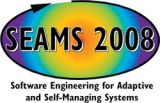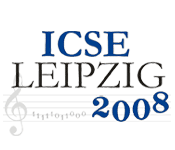Workshop goals
The proposed ICSE 2008 SEAMS workshop is a continuation of a number of successful workshops in the area of self-managing systems held at ICSE and FSE in recent years, including the FSE 2002 and 2004 Workshops on Self-Healing (Self-Managed) Systems (WOSS), ICSE 2005 Workshop on Design and Evolution of Autonomic Application Software (DEAS), ICSE 2006 and 2007 Workshops on Software Engineering for Adaptive and Self-Managing Systems (SEAMS) and the ICSE 2002, 2003, 2004 and 2005 Workshops on Architecting Dependable Systems (WADS). The organizers of this workshop are attempting to consolidate interest in the ICSE and FSE software engineering communities on autonomic, self-managing, self-healing, self-optimizing, self-configuring, and self-adaptive systems through this integrated SEAMS workshop. We hope this will be the second of several workshops to identify progress and challenges in this important area of software engineering. There are other related conferences and workshops including IEEE International Conference on Autonomic Computing (ICAC); Autonomic Computing Workshop (AMS); Conference on Human Impact and Application of Autonomic Computing Systems (CHIACS); Autonomic Applications Workshop (AAW); and Engineering of Autonomic Systems (EaAS).
Workshop theme
An increasingly important requirement for software-intensive systems is the ability to self-manage by adapting at run time to handle such things as resource variability, changing user needs, and system intrusions or faults. Such a system must configure and reconfigure itself, continually tune and optimize itself, protect and recover itself, while keeping its complexity hidden from the user.
The topic of self-adaptive and self-managing systems has been studied in a variety of application areas, including autonomic computing, robotics, control systems, programming languages, software architectures, fault-tolerant computing, and biological computing. The goal of this symposium is to bring together researchers and practitioners from many of these diverse areas to discuss the fundamental principles, state of the art, and critical challenges of self-adaptive and self-managing systems. Specifically, we intend to focus on the software engineering aspects, including the methods, architectures, algorithms, techniques and tools that can be used to support dynamic adaptive and self-managing behavior.
Topics of interest include, but are not limited to: programming, design and architectural language support for the self-adaptation of software (including exception handling, reflection, and aspect orientation); algorithms for software self-management; integration mechanisms for self-adaptive and self-managing systems (including the dynamic synthesis of wrappers for legacy systems); formal notations for modeling and analysis of software self-adaptation, including sound cost-benefit analysis; architectural styles and architecture patterns for supporting the self-adaptation; verification and validation of self-adaptive and self-managing software; methods for engineering user-trust into self-managing systems; mechanisms to determine the runtime state of the system as a prerequisite to determining adaptation alternatives; methods to instrument existing systems to observe self-managing behaviour over long periods of time; adaptive components; constraint-based approaches to adaptation and self-organizing systems; evaluation and assurance for self-adaptive systems; decision making techniques for self-adaptive systems; assessing (at runtime) the success of an adaptation made, and mechanisms for recovering/rolling-back from poor choices; run-time checks of architectural models. The following application areas are of particular interest: autonomic computing; mobile computing; dependable computing; autonomous robotics; adaptable user interfaces; service-oriented architectures.

